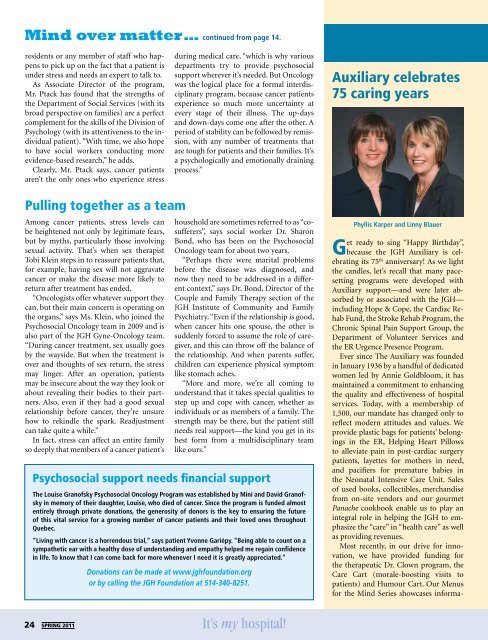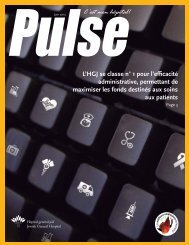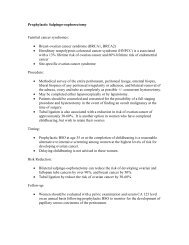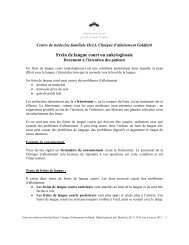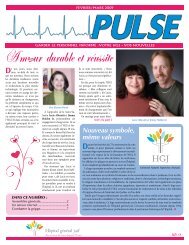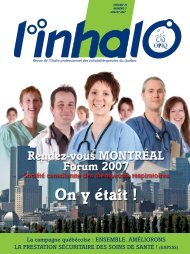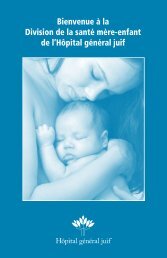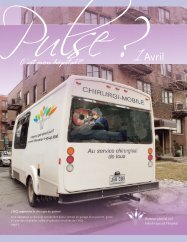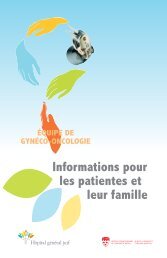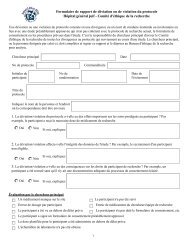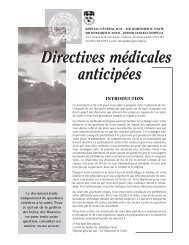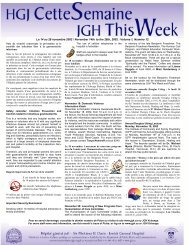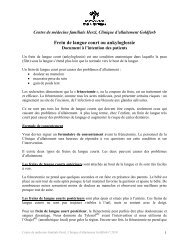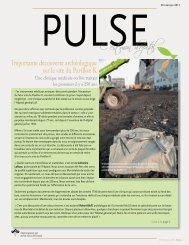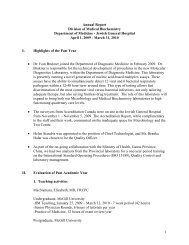No appointment? No problem!
No appointment? No problem!
No appointment? No problem!
Create successful ePaper yourself
Turn your PDF publications into a flip-book with our unique Google optimized e-Paper software.
Mind over matter… continued from page 14.<br />
residents or any member of staff who happens<br />
to pick up on the fact that a patient is<br />
under stress and needs an expert to talk to.<br />
As Associate Director of the program,<br />
Mr. Ptack has found that the strengths of<br />
the Department of Social Services (with its<br />
broad perspective on families) are a perfect<br />
complement for the skills of the Division of<br />
Psychology (with its attentiveness to the individual<br />
patient). “With time, we also hope<br />
to have social workers conducting more<br />
evidence-based research,” he adds.<br />
Clearly, Mr. Ptack says, cancer patients<br />
aren’t the only ones who experience stress<br />
Pulling together as a team<br />
Among cancer patients, stress levels can<br />
be heightened not only by legitimate fears,<br />
but by myths, particularly those involving<br />
sexual activity. That’s when sex therapist<br />
Tobi Klein steps in to reassure patients that,<br />
for example, having sex will not aggravate<br />
cancer or make the disease more likely to<br />
return after treatment has ended.<br />
“Oncologists offer whatever support they<br />
can, but their main concern is operating on<br />
the organs,” says Ms. Klein, who joined the<br />
Psychosocial Oncology team in 2009 and is<br />
also part of the JGH Gyne-Oncology team.<br />
“During cancer treatment, sex usually goes<br />
by the wayside. But when the treatment is<br />
over and thoughts of sex return, the stress<br />
may linger. After an operation, patients<br />
may be insecure about the way they look or<br />
about revealing their bodies to their partners.<br />
Also, even if they had a good sexual<br />
relationship before cancer, they’re unsure<br />
how to rekindle the spark. Readjustment<br />
can take quite a while.”<br />
In fact, stress can affect an entire family<br />
so deeply that members of a cancer patient’s<br />
24 spriNG 2011<br />
during medical care, “which is why various<br />
departments try to provide psychosocial<br />
support wherever it’s needed. But Oncology<br />
was the logical place for a formal interdisciplinary<br />
program, because cancer patients<br />
experience so much more uncertainty at<br />
every stage of their illness. The up-days<br />
and down-days come one after the other. A<br />
period of stability can be followed by remission,<br />
with any number of treatments that<br />
are tough for patients and their families. It’s<br />
a psychologically and emotionally draining<br />
process.”<br />
household are sometimes referred to as “cosufferers”,<br />
says social worker Dr. Sharon<br />
Bond, who has been on the Psychosocial<br />
Oncology team for about two years.<br />
“Perhaps there were marital <strong>problem</strong>s<br />
before the disease was diagnosed, and<br />
now they need to be addressed in a different<br />
context,” says Dr. Bond, Director of the<br />
Couple and Family Therapy section of the<br />
JGH Institute of Community and Family<br />
Psychiatry. “Even if the relationship is good,<br />
when cancer hits one spouse, the other is<br />
suddenly forced to assume the role of caregiver,<br />
and this can throw off the balance of<br />
the relationship. And when parents suffer,<br />
children can experience physical symptom<br />
like stomach aches.<br />
“More and more, we’re all coming to<br />
understand that it takes special qualities to<br />
step up and cope with cancer, whether as<br />
individuals or as members of a family. The<br />
strength may be there, but the patient still<br />
needs real support—the kind you get in its<br />
best form from a multidisciplinary team<br />
like ours.”<br />
Psychosocial support needs financial support<br />
The Louise Granofsky Psychosocial Oncology Program was established by Mini and David Granofsky<br />
in memory of their daughter, Louise, who died of cancer. Since the program is funded almost<br />
entirely through private donations, the generosity of donors is the key to ensuring the future<br />
of this vital service for a growing number of cancer patients and their loved ones throughout<br />
Quebec.<br />
“Living with cancer is a horrendous trial,” says patient Yvonne Gariépy. “Being able to count on a<br />
sympathetic ear with a healthy dose of understanding and empathy helped me regain confidence<br />
in life. To know that I can come back for more whenever I need it is greatly appreciated.”<br />
Donations can be made at www.jghfoundation.org<br />
or by calling the JGH Foundation at 514-340-8251.<br />
It’s Care my for hospital!<br />
all.<br />
Auxiliary celebrates<br />
75 caring years<br />
Phyllis Karper and Linny Blauer<br />
Get ready to sing “Happy Birthday”,<br />
because the JGH Auxiliary is celebrating<br />
its 75th anniversary! As we light<br />
the candles, let’s recall that many pacesetting<br />
programs were developed with<br />
Auxiliary support—and were later absorbed<br />
by or associated with the JGH—<br />
including Hope & Cope, the Cardiac Rehab<br />
Fund, the Stroke Rehab Program, the<br />
Chronic Spinal Pain Support Group, the<br />
Department of Volunteer Services and<br />
the ER Urgence Presence Program.<br />
Ever since The Auxiliary was founded<br />
in January 1936 by a handful of dedicated<br />
women led by Annie Goldbloom, it has<br />
maintained a commitment to enhancing<br />
the quality and effectiveness of hospital<br />
services. Today, with a membership of<br />
1,500, our mandate has changed only to<br />
reflect modern attitudes and values. We<br />
provide plastic bags for patients’ belongings<br />
in the ER, Helping Heart Pillows<br />
to alleviate pain in post-cardiac surgery<br />
patients, layettes for mothers in need,<br />
and pacifiers for premature babies in<br />
the Neonatal Intensive Care Unit. Sales<br />
of used books, collectibles, merchandise<br />
from on-site vendors and our gourmet<br />
Panache cookbook enable us to play an<br />
integral role in helping the JGH to emphasize<br />
the “care” in “health care” as well<br />
as providing revenues.<br />
Most recently, in our drive for innovation,<br />
we have provided funding for<br />
the therapeutic Dr. Clown program, the<br />
Care Cart (morale-boosting visits to<br />
patients) and Humour Cart. Our Menus<br />
for the Mind Series showcases informa-


